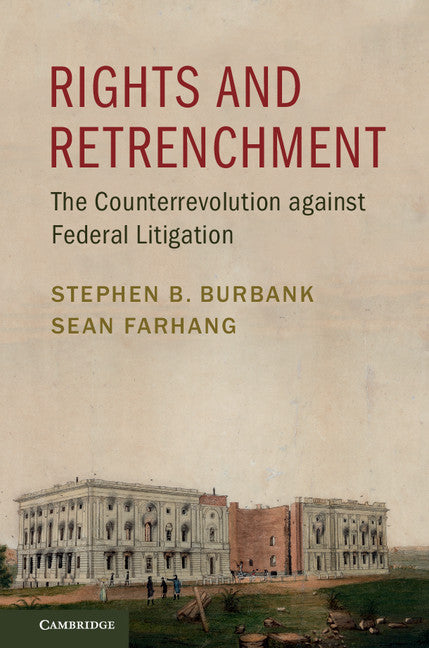Freshly Printed - allow 4 days lead
Couldn't load pickup availability
Rights and Retrenchment
The Counterrevolution against Federal Litigation
This book shows how an increasingly conservative Supreme Court has undermined the enforcement of rights through strategies rejected by Congress.
Stephen B. Burbank (Author), Sean Farhang (Author)
9781316502044, Cambridge University Press
Paperback / softback, published 18 April 2017
292 pages
22.9 x 15.2 x 1.2 cm, 0.47 kg
'In this elegant study, Stephen B. Burbank and Sean Farhang demonstrate that the Supreme Court has dramatically undercut enforcement of federal rights by making it harder for plaintiffs to sue in the first place. Rich in data, thoughtful and perceptive in analysis, this book is a landmark contribution to our understanding of the Supreme Court and the meaningful enforcement of federal rights.' Charles Epp, Distinguished Professor, University of Kansas
This groundbreaking book contributes to an emerging literature that examines responses to the rights revolution that unfolded in the United States during the 1960s and 1970s. Using original archival evidence and data, Stephen B. Burbank and Sean Farhang identify the origins of the counterrevolution against private enforcement of federal law in the first Reagan Administration. They then measure the counterrevolution's trajectory in the elected branches, court rulemaking, and the Supreme Court, evaluate its success in those different lawmaking sites, and test key elements of their argument. Finally, the authors leverage an institutional perspective to explain a striking variation in their results: although the counterrevolution largely failed in more democratic lawmaking sites, in a long series of cases little noticed by the public, an increasingly conservative and ideologically polarized Supreme Court has transformed federal law, making it less friendly, if not hostile, to the enforcement of rights through lawsuits.
1. Retrenching rights in institutional context: constraints and opportunities
2. The legislative counterrevolution: emergence, growth, and disappointment
3. The rulemaking counterrevolution: birth, reaction, and struggle
4. The counterrevolution in the Supreme Court: succeeding
5. The subterranean counterrevolution: the Supreme Court, the media, and public opinion
6. Rights, retrenchment, and democratic governance.
Subject Areas: Human rights & civil liberties law [LNDC], Judicial powers [LNAA1], Courts & procedure [LNAA], Legal system: general [LNA], Central government [JPQ]


